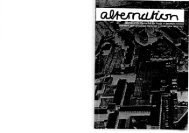Re-reading The Purloined Letter - Alternation Journal
Re-reading The Purloined Letter - Alternation Journal
Re-reading The Purloined Letter - Alternation Journal
You also want an ePaper? Increase the reach of your titles
YUMPU automatically turns print PDFs into web optimized ePapers that Google loves.
375<br />
<strong>Re</strong>-<strong>reading</strong> <strong>The</strong> <strong>Purloined</strong> <strong>Letter</strong><br />
(and a linguistic order) which he has not created, and which imposes on him<br />
the laws of the social order—he is, then, subject to a system he cannot<br />
control, and so his developing subjectivity comes into being through an<br />
experience of power (of the Other in its various forms) and lack (of control,<br />
of his own narcissistic self-unity which the social order does not recognize).<br />
Lacan (1977:05) writes in his famous essay <strong>The</strong> Mirror Stage that the end of<br />
this moment ushers the child into the socially- governed system of the<br />
Symbolic:<br />
This moment in which the mirror-stage comes to an end inaugurates,<br />
by the identification with the imago of the counterpart and the drama<br />
of primordial jealousy …, the dialectic that will henceforth link the I<br />
to socially elaborated situations.<br />
It is here, when the ‘I’ is linked to socially elaborated situations that desire<br />
which is predicated on lack becomes possible, and also here that entry into<br />
language begins uneasily to take place, at the same time as an equally<br />
difficult move towards gender identification. This, then, is the beginning of<br />
subjectivity, since it is only through language as a system of difference that<br />
subjective identity can be stated, thought, articulated—it is also the moment<br />
at which the unconscious is born, since here repression takes place. Sexual<br />
difference and language are thus both effects of entry into the Symbolic<br />
Order. Entry into language is differently negotiated by girls and boys.<br />
However, girls do not view the mother, castration, or the threat of the father<br />
in the same way, in Freud’s final model (from the early 1930’s essays on<br />
femininity onwards), or in Lacan’s work. <strong>The</strong>y do not feel the loss of the<br />
mother’s body as boys do, and so the work of Symbolic substitution (and<br />
consequently their entry into the Symbolic) does not, for Lacan, come as<br />
easily. As Ragland-Sullivan (1992:421) puts it:<br />
Language itself serves as the signified that tells the particular story<br />
of the knotting (or not) of the three orders (Imaginary, Symbolic,<br />
<strong>Re</strong>al) in an individual’s life in terms of acquisition of gender as an<br />
identity.

















